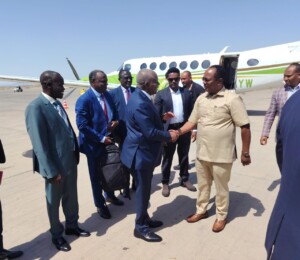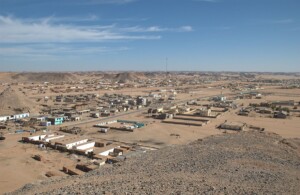Sudan negotiations: Will high spirits be marred by sticking points?
Negotiations are underway between the delegation of the forces of the Declaration of Freedom and Change and the Transitional Military Council (TMC) on transition arrangements, focusingon the powers of a civil council during the interim period, after which elections will be held.
 The delegation of Forces of Freedom and Change and the Transitional Military Council meet to negotiate on 28 April 2019 (RD)
The delegation of Forces of Freedom and Change and the Transitional Military Council meet to negotiate on 28 April 2019 (RD)
Negotiations are underway between the delegation of the forces of Freedom and Change and the Transitional Military Council (TMC) on transition arrangements, focusing on the powers of a civil council during the interim period, after which elections will be held.
The official negotiations between the two sides began on Saturday. Radio Dabanga learned that the TMC initially put forward seven military personnel for the council and three civilians while the forces of Freedom and Change suggested seven civilians and two military personnel. Military sources informed Radio Dabanga that the parties amended the number to eight civilians and seven military personnel.
Today, the two sides had been set to talk once more about the make-up of the proposed body, but military officers focussed the discussions instead on the future council’s functions and powers, according to Reuters. Thus, a further meeting will be held to discuss the composition of the council, a crucial point for Freedom and Change forces.
Participants hopeful
The spokesman for the TMC, Lt Gen Shamseldin Kabbashi said in a press statement in Khartoum on Sunday that “high spirit and transparency” prevailed throughout negotiations, and expressed optimism about reaching a result as soon as possible.
Abbas Madani, the press representative of the forces of Freedom and Change, expected the negotiations “to reach satisfactory results to the aspirations and hopes of the Sudanese people if the same spirit prevails”.
NUP leader
In a press conference on Saturday, El Sadig El Mahdi, President of the National Umma Party said that “the forces of the Declaration of Freedom and Change will provide the Military Council with the structure required for transitional government, including a sovereign legislative council, a national security council, and a cabinet of experienced civil ministers without party participation.
He pointed to a proposal for a legislative council representing the forces of the Declaration of Freedom and Change and other political forces that opposed the former regime, together with qualified national figures, taking into account the representation of displaced people, the marginalised areas, women, and youth. According to the leader, a constitutional declaration will govern this agreement.
El Mahdi lauded the armed forces, and the leadership of the paramilitary Rapid Support Forces for “this honourable position”, as well as the cohesion of the forces of Freedom and Change despite their differences, insisting on the success of the blessed revolution and leadership towards safety.
Civil group opposed
Yet the newly established Sudanese Political and Civil Women Groups are opposed to the extension of the mandate of Sudan's Military Council to three months. In an appeal to African Union, Commission Chairman Moussa Faki Mahamat, and the African Peace and Security Council, the women groups protested the decision to extend the mandate without taking into account the voice of the people represented in the forces of Freedom and Change that has led the revolutionary movement over the last four months.
The group stated that this recommendation is inconsistent with the demands of the Sudanese revolution.











 and then
and then